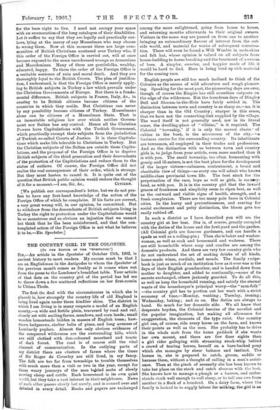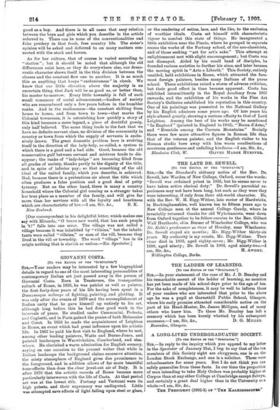THE COUNTRY GIRL IN THE COLONIES.
LTO TEDI EDITOR OP TRH "SPECTATOR.")
Sra,—An article in the Spectator of October 11th, 1902, is ancient history to most readers. My excuse must be that I am an Englishman in the Antipodes to whom the Spectator of the previous month comes as freshly as it comes when wet from the press to the Londoner's breakfast table. Your article of that date on the country girl of the period has led me to throw down a few scattered reflections on her first-cousin in Ultima Thule.
The first (to deal with the circumstances in which she is placed) is, how strangely the country life of old England is being lived again under these kindlier skies. The district in which I am living is in many respects a model of an English county,—a wide and fertile plain, traversed by road and rail, closely set with smiling farms, meadows, and corn lands ; small wooden homesteads hidden in masses of English trees ; haw- thorn hedgerows, shelter belts of pines, and long avenues of Lombardy poplars. Almost the only obvious evidences of the conquered wilderness are the surrounding hills, which are still clothed with dun-coloured moorland and tracts of dark forest. The road is of course still the vital channel of communication. In the outlying parts of my district there are clusters of farms where the times of Sir Roger de Coverley are still lived, in my fancy. The folk are too far from townships to trouble themselves with much more than a visit or two in the year, except for those weary journeys of the men beisind mobs of slowly moving sheep and cattle. Each homestead is its own quiet world, but they take a vast interest in their neighbours. News of each other passes slowly but surely, and is conned over and debated in every detail. Books and papers are exchanged among the more enlightened, going from house to house, and returning months afterwards to their original owners. Visitors in the same way are passed on from one to another. bringing an extraordinary flavour of interest from the out, side world, and material for weeks of subsequent conversa- tion. There will even be found a Will Wimble in mole-skins and felt hat, whose opinion is valued on all subjects from house-building to horse-breaking and the treatment of a swarm of bees. A simpler, sweeter, and happier mode of life it would be hard to find. Here is being bred up rich material for the coming race.
English people are still too much inclined to think of the Colonies as the scenes of wild adventure and rough pioneer. ing. Speaking for the most part, the pioneering days are over, though of course the Empire has still countless outposts on the edge of the wilderness. But the humdrum days of Dingley Dell and Slocum-in-the-Hole have fairly settled in. The distinction between town and country is as sharp as,—no, it is sharper than in the Old Country ; sharper in this sense, that we have not the connecting-link supplied by the village. The word itself is not generally used, nor in its literal sense, the dwelling-place of "villeins," is it required. The Colonial "township," if it is only the merest cluste.• of cabins in the bush, is the microcosm of the city, -.'-a business centre for the surrounding country. Its inhabitants are townsmen, all employed in their trades and professions. And so the distinction with us between town and country girls is, to judge from your article, even more marked than it is with you. The small township, too often fermenting with gossip and ill-nature, is not the best place for the development of the larger virtues—calmness, contentment, a broad and charitable view of things—as every one will admit who knows middle-class provincial town life. The best stock for the perpetuation of the race, boys as well as girls, is cotsoiry- bred, as with you. It is in the country girl that the inward graces of frankness and simplicity seem to ripen best, as well as the outward and visible signs of health, strength, and a fresh complexion. There are too many pale faces in Colonial cities. In the hurry and pretentiousness, and craving for social excitement and petty distinction, the bloom gets too easily rubbed off.
In such a district as I have described you will see the country girl at her best. She is, of course, greatly occupied with the duties of the house and the fowl-yard and the garden. (All Colonial girls are famous gardeners, and can handle a spade as well as a rolling-pin.) Then she is baker and washer- woman, as well as cook and housemaid and waitress. There are still households where soap and candles are among the domestic products. And there are very few country girls who do not understand the art of making drinks of all kinds, home-made wines, cordials, and meads. The family r scipe- book is just as much of an institution here as it ever was in the days of their English grandmother, and is handed down from mother to daughter, and added to continually,—some of its secrets exchanged, others jealously guarded. To do all this, as well as keep the household running, and satisfy the eternal wants of the housekeeper's principal worry—the " men-folk " —the country girl has to portion out her week with a strict economy of time,—Monday, washing ; Tuesday, ironing; Wednesday, baking ; and so on. Her duties are always to hand. So much for her domestic side. We all know that desperate hoyden, the Colonial heroine of the novelist and the popular imagination, but making all allowance for exaggeration, the elements of the type exist. Our country girl can, of course, ride every horse on the farm, and knows their points as well as the men. She probably has to drive in the whole mob from the home paddock if she wants her own mount, and there are few finer sights than a girl rider galloping with streaming stock-whip behind a crowd of tearing horses, herself on a bare-backed pony which she manages by sheer balance and instinct. The horses in, she is prepared to catch, groom, saddle or harness them, without a thought of calling in a man's assist- ance. Then at the pinch of necessity she has been known to take her place on the stack and catch sheaves with the best. She knows how to manage a plough or a barrow, and under- stands stock well enough to cull sheep, or to tell one ewe from another in a flock of a hundred. On a dairy farm, where the family is looked to to supply labour for milking, the girl is as
good as a boy. And there is in all cases that easy relation between the boys and girls which you describe in the article referred to. There can be none of the conventionalities and false prudery in that fresh, free country life. The sister's opinion will be asked and deferred to on many matters con- nected with the stock and horses.
As for her culture, that of course is varied according to " station "; but it should be noted that although the old differences exist here, as they do everywhere else, our demo- cratic character shows itself in the thin division between the classes and the constant flow one to another. It is as much this as anything that keeps " exclusiveness " in check. We know that our little elevation above the majority is an uncertain thing, that Jack will be as good as, or better than, his master to-morrow. Every little township is full of such small romances of social advancement,—leaders of society who are remembered only a few years before in the humbler ranks. And in the restlessness—the constant shifting from house to house, and from town to town—that marks the Colonial townsman, it is astonishing how quickly a story of this kind becomes a mere legend, a piece of doubtful gossip, only half believed. The same thing leads to the fact that we have no definite servant class, no division of the community in country or town from which the supply of servants is exclu- sively drawn. The great domestic problem here is evolving itself in the direction of the lady-help, so-called, a system to which there is a good and a bad side. Good, because the old conservative gulf between servant and mistress tends to dis- appear; the ranks of " lady-helps " are becoming filled from all grades of society, thanks partly to the dignity of the title, and in spite of inferior pay ; so that something of the old ideal of the united family, which you describe, is achieved. Bad, because there is a pretentious air about the title which often produces a false position and a good deal of petty tyranny. But on the other hand, there is many a country household where the Colonial girl coming as a stranger takes her true place as a member of the family, and will give far more than her services with all the loyalty and heartiness
which are characteristic of her.—I am, Sir, &c., E. K. New Zealand.
[Our correspondent in his delightful letter, which makes one .ay with Miranda, "0 brave new world, that has such people in 't!" falls into one error. The village was not called a village because it was inhabited by "villeins," but the inhabi- tants were called "villeins," or men of the vill, because they lived in the viii or township. The word " village " has in its origin nothing that is slavish or unfree.—En. Spectator.]











































 Previous page
Previous page